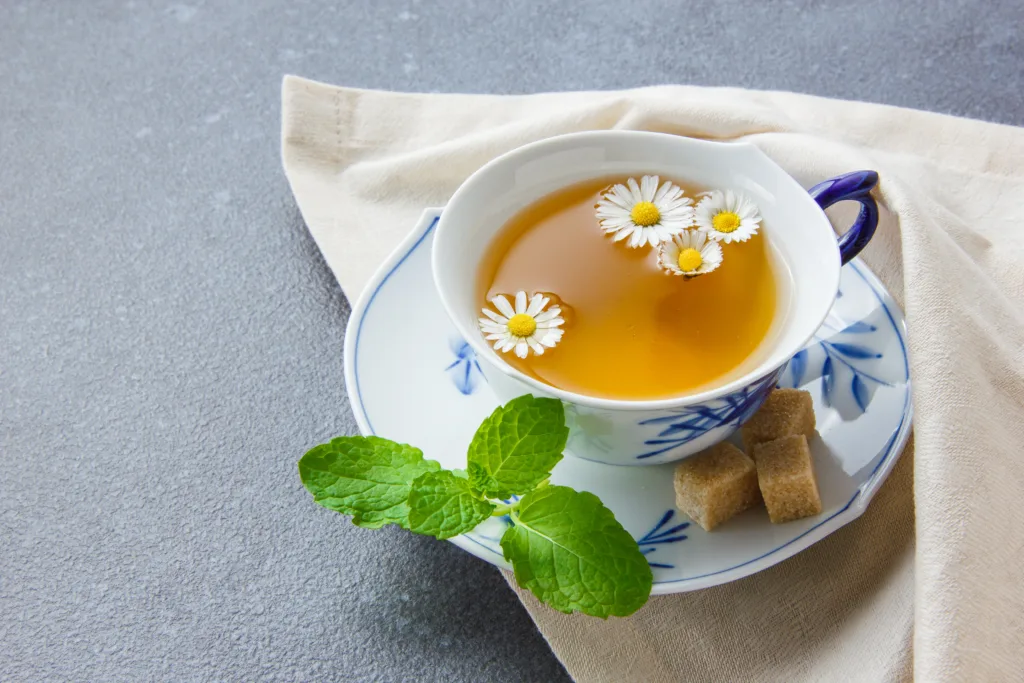Chamomile, a herb derived from the daisy-like flowers of the Asteraceae plant family, has been used for centuries for its medicinal properties. Its delicate flowers are more than just a pretty sight; they pack a powerful punch when it comes to promoting health and wellness. In this article, we will explore the various health benefits and uses of chamomile, providing insights into why it remains a popular natural remedy today.
What is Chamomile?
Chamomile, particularly the German chamomile (Matricaria chamomilla) and Roman chamomile (Chamaemelum nobile), is renowned for its therapeutic properties. This herb is commonly consumed as a tea, but it is also available in other forms such as essential oils, capsules, and topical creams.

Nutritional Profile of Chamomile
Chamomile is not only known for its medicinal properties but also for its modest nutritional value. While it is primarily consumed for its therapeutic benefits, chamomile also provides essential nutrients and bioactive compounds.
Vitamins:
- Vitamin A: Important for vision, immune function, and skin health.
- Vitamin C: Known for its antioxidant properties and role in collagen synthesis and immune support.
- Folate: Essential for DNA synthesis and repair, and vital during periods of rapid growth.
Minerals:
- Calcium: Necessary for bone health and muscle function.
- Magnesium: Plays a role in over 300 enzymatic reactions, including energy production and muscle function.
- Potassium: Helps regulate fluid balance, nerve signals, and muscle contractions.
Bioactive Compounds:
- Flavonoids (such as apigenin): Known for their antioxidant, anti-inflammatory, and anti-cancer properties.
- Terpenoids (such as chamazulene): Possess anti-inflammatory and antioxidant activities.
- Coumarins: Exhibit anticoagulant, anti-inflammatory, and antimicrobial effects.
Health Benefits of Chamomile
1. Promotes Sleep and Reduces Insomnia
Chamomile is perhaps best known for its sleep-inducing properties. Its calming effect on the nervous system can help promote relaxation and facilitate a good night’s sleep. Chamomile tea, consumed before bedtime, can reduce insomnia and improve sleep quality.
2. Reduces Stress and Anxiety
The soothing properties of chamomile extend beyond promoting sleep. Chamomile contains compounds that bind to receptors in the brain, reducing anxiety and promoting a sense of calm. Regular consumption of chamomile tea can help manage stress and anxiety levels effectively.
3. Aids Digestion
Chamomile is a digestive aid, helping to alleviate various gastrointestinal issues such as bloating, gas, and indigestion. It has anti-inflammatory properties that soothe the digestive tract, making it a go-to remedy for stomach cramps and irritable bowel syndrome (IBS).
4. Boosts Immune System
Chamomile possesses antibacterial and antiviral properties, which help boost the immune system. Regular consumption can help fend off common illnesses such as colds and flu. The herb also contains antioxidants that protect the body from harmful free radicals.
5. Anti-Inflammatory and Pain Relief
Chamomile’s anti-inflammatory properties make it an effective remedy for conditions such as arthritis and other inflammatory disorders. It can be used topically to relieve pain and reduce inflammation in the affected areas.
6. Improves Skin Health
Chamomile is beneficial for the skin, thanks to its anti-inflammatory, antimicrobial, and antioxidant properties. It can help soothe skin irritations, such as eczema and psoriasis, and promote the healing of wounds. Chamomile-infused creams and oils are popular for their ability to enhance skin health and appearance.
7. Menstrual Pain Relief
For women, chamomile can provide relief from menstrual cramps. The herb’s antispasmodic properties help relax the muscles of the uterus, reducing the intensity of menstrual pain. Drinking chamomile tea can be particularly beneficial during menstruation.

Uses of Chamomile
1. Chamomile Tea
Chamomile tea is the most common and easiest way to enjoy the benefits of this herb. Simply steeping dried chamomile flowers in hot water creates a soothing beverage that can be consumed daily. This tea can be enjoyed hot or cold and can be sweetened with honey if desired.
2. Chamomile Essential Oil
Chamomile essential oil is used in aromatherapy for its calming effects. It can be diffused in the air, added to bath water, or used in massage oils. The oil is also beneficial for the skin and can be applied topically to soothe irritations and enhance skin health.
3. Topical Applications
Chamomile can be found in various topical products, such as creams, lotions, and ointments. These products are used to treat skin conditions, reduce inflammation, and promote healing. Chamomile compresses, made by soaking a cloth in chamomile tea, can be applied to the skin to relieve irritation and pain.
4. Chamomile Capsules and Supplements
For those who prefer not to drink tea, chamomile is available in capsule and supplement form. These can be taken as part of a daily health regimen to enjoy the herb’s numerous benefits.
5. Chamomile in Bath Products
Chamomile is often used in bath products, such as bath salts and bath bombs, for its relaxing and skin-soothing properties. Adding chamomile to a warm bath can provide a calming and therapeutic experience.

How to Choose and Store Chamomile
When selecting chamomile, whether in tea, oil, or supplement form, it is important to choose high-quality, organic products. Organic chamomile ensures that you are not ingesting or applying any harmful pesticides or chemicals. Dried chamomile flowers should be stored in an airtight container in a cool, dark place to preserve their potency and freshness.
Potential Side Effects and Precautions
While chamomile is generally safe for most people, it can cause allergic reactions in some individuals, particularly those allergic to plants in the daisy family. Pregnant and breastfeeding women should consult with a healthcare provider before using chamomile. Additionally, chamomile may interact with certain medications, so it is important to discuss its use with a doctor if you are taking any prescription drugs.
Conclusion
Chamomile is a versatile and powerful herb with a wide range of health benefits and uses. From promoting sleep and reducing anxiety to aiding digestion and enhancing skin health, chamomile has earned its place as a staple in natural medicine. By incorporating chamomile into your daily routine, you can take advantage of its therapeutic properties and improve your overall well-being.
Incorporating chamomile into your lifestyle is simple and can be tailored to your preferences, whether through tea, essential oils, topical applications, or supplements. As with any natural remedy, it is important to use chamomile mindfully and consult with a healthcare provider if you have any concerns or pre-existing conditions. With its long history of use and extensive health benefits, chamomile remains a valuable addition to any health regimen.
Topics covered
- What is Chamomile?
- What are key nutrients in Chamomile?
- What are health benefits of Chamomile?
- How is Chamomile good for health?
- What are uses of Chamomile?
- Side effects and Precautions using Chamomile.








2 thoughts on “Unlock the Power of Chamomile: A Natural Remedy for Health and Wellness”